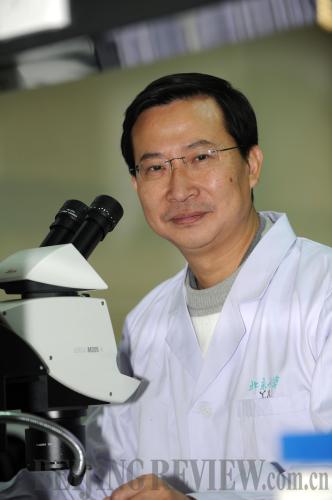|
 |
|
CHALLENGER: Rao Yi, Dean of the School of Life Sciences, Peking University, failed in last year's selection of CAS academicians (CFP) |
China's leading scientific research institutions, the Chinese Academy of Sciences (CAS) and the Chinese Academy of Engineering (CAE), announced newly elected academicians on December 9, 2011.
The CAS was established in 1949 and the CAE in 1994. Their academicians are top honorary titles in China for scientists and technologists who have made outstanding contributions to the country.
After the new additions, the CAS has 727 academicians and the CAE 783.
At the admission ceremony, Bai Chunli, President of the CAS, told new academicians not to be complacent and see the title as conferring authority over others. Instead he urged them to continue to scale new scientific heights.
Bai's call was not official cliché, given the increasing criticism of China's academician system.
A major complaint about the academician system is the transparency of the selection procedures.
In May 2011, the CAE's initial list of 485 candidates for its membership sparked fierce debate as it included many current and former top executives at major state-owned enterprises and senior government officials.
Some notable examples were Wu Qidi and Zhao Qinping, both former Vice Ministers of Education, Shen Xiaoming, Vice Mayor of Shanghai, and Fu Chengyu, Chairman of Sinopec, China's largest oil refiner.
Among the 44 candidates competing for the title of academician in the field of engineering management, nearly half were executives of large state-owned enterprises or government officials.
The prevalence of officials led to widespread criticism that the CAE was becoming a club for people in power rather than a body genuinely devoted to excellence in research.
In response to the criticism, the CAE said that the selection criteria focused on "candidates' contribution to the country" and "academic background" and only senior engineers, researchers and professors are eligible for nomination.
"Although some candidates are officials or top executives, they once contributed to the development of cutting-edge science and technology in China," said a press release of the academy.
After several rounds of review, no incumbent or former government officials were included in the final list of entrants to the CAE, and only eight of the new academicians had or were serving at leadership positions in state-owned enterprises.
Twenty five, or 46.3 percent of the CAE's new members are from universities. But more than 60 percent of them were university presidents or vice presidents.
After the announcement of newly elected academicians, Xu Rigan, Vice President of the CAE, said that while some candidates were officials and top executives of state-owned enterprises, only those with a previous scientific background had been admitted to the academy. "During the review processes, their academic qualifications were evaluated by the CAE's evaluation committee, and the threshold cannot be lowered," he said.
"Because the title of academician is associated with honor, power, research funds, and better academic and social status, some individuals and even their employers engage in canvassing activities to secure CAS and/or CAE membership," said Wang Yangzong, Deputy Director of the Institute for the History of Natural Sciences under the CAS.
He accuses China's academician system of having deviated from its previous course in recent years and labels Chinese academicians as a privileged stratum.
According to a study by Zhang Guang and two other professors at the Zhou Enlai School of Government at Nankai University in Tianjin, a scientist's fame and prestige are more important than actual research productivity when securing funds.
Because academicians enjoy privileges when it comes to getting research funds, many institutions offer high salaries in order to recruit them. For example, Wuhan University of Technology in central China's Hubei Province, offered academicians who agreed to work there for two months in a year 5 million yuan ($770,000) in research funds plus a 500,000-yuan ($77,000) one-time award, in addition to a spacious apartment and a high monthly salary.
| 